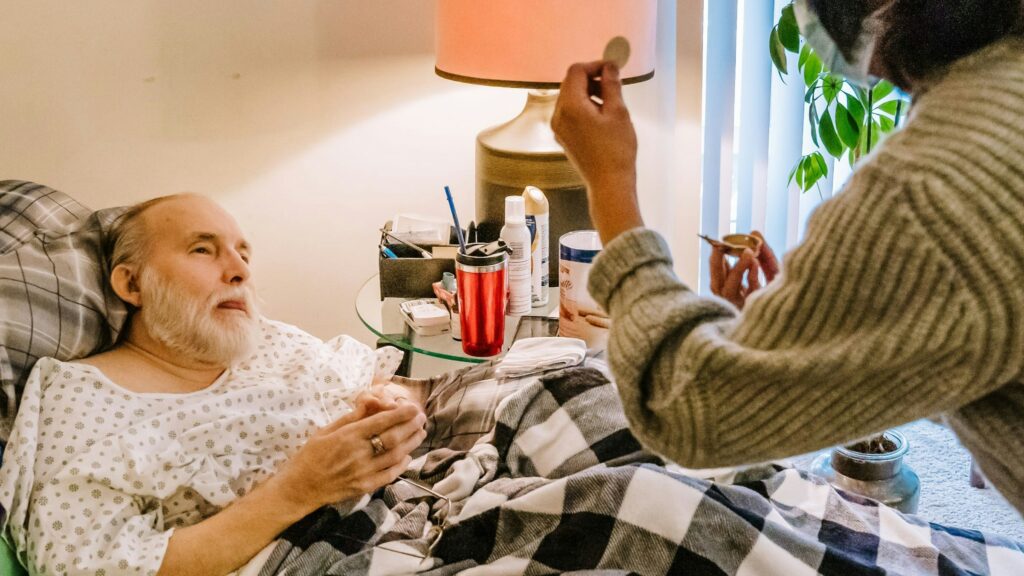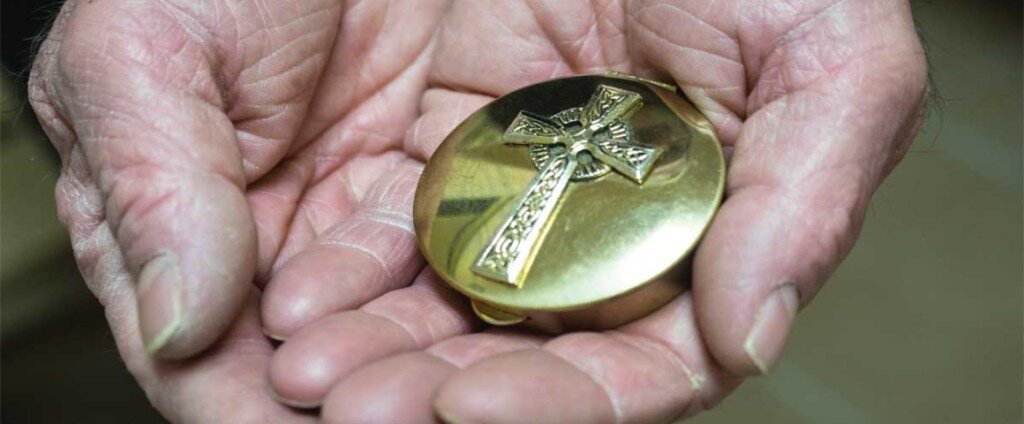Are you being called to bring Jesus to those who are sick and homebound and who cannot attend the Holy Mass?
The Homebound ministry provides the Body of Christ to parishioners who are unable to join the community at Mass, either temporarily or for an extended period of time. The Sacrament that is brought to the homebound is an extension of the Eucharist celebration at our Daily and Sunday Masses.
St. Dominic’s is in need of Lay Extraordinary Ministers who can serve in this ministry. Although this ministry is one of dedication and commitment the spiritual reward is great; If interested in ministering to the sick and homebound or know of someone who is in need of Jesus in the Holy Eucharist please contact Rudy Castro at 210-422-8134.
If you’d like to become a Homebound Minister or know someone who would like to receive Jesus in the Holy Eucharist, please use link below.
https://stdominicsa.org/ministry-request-form/
May God’s Peace Abide in You.

Jesus' body in the Holy Eucharist
And he took bread, gave thanks and broke it, and gave it to them, saying, “This is my body given for you; do this in remembrance of me.” Luke 22:19

Visiting the Sick
Jesus said to them, "I am the bread of life; whoever comes to me will never hunger, and whoever believes in me will never thirst." John 6:35

.

.
Guidelines for Extraordinary Ministers of Holy Communion
Archdiocese of San Antonio
Introduction
“The proof of his boundless charity that Christ the Lord left to his Bride the Church, namely, the inexpressible and supreme gift of the Eucharist, requires us to deepen our appreciation of this great mystery and to share ever more fully in its saving power.… The new conditions of the present seem to demand that, without prejudice to the supreme reverence due to so great a sacrament, access to communion be made easier, so that by sharing more fully in the effects of the sacrifice of the Mass, the faithful may more willingly and intensely give themselves to God and to the good of the Church and of all humanity”.
Immensae Caritatis, 1973, Introduction
With these words, the Church opens her instruction which permits lay men and women to assist with the distribution of Holy Communion. This privilege and duty extend from the Church’s desire to make the Eucharist more easily available to the faithful. In March of 1971, the National Conference of Catholic Bishops received permission from the Vatican to introduce the practice of Extraordinary Ministers of Holy Communion in the United States and soon after this liturgical practice was introduced in the Archdiocese of San Antonio. Since that time, the service of Extraordinary Ministers of Holy Communion in the Archdiocese has been extended to include offering Holy Communion to the sick in their homes and in healthcare facilities, as well as to those incarcerated in prisons. We are truly grateful for those who serve as Extraordinary Ministers of Holy Communion.
Effective June 11, 2023, The Solemnity of the Most Holy Body and Blood of Christ.
Why are Extraordinary Ministers of Holy Communion needed and Who can be a candidate
Extraordinary Ministers of Holy Communion may be appointed in parishes, religious houses, and chaplaincies and should correspond to genuine pastoral need where ordinary ministers are not available or insufficient in number:
a. To facilitate the distribution of Holy Communion within Mass when there is a large number of communicants:
b. To allow for a more frequent, even daily, administration of Holy Communion
outside of Mass to those impeded from, or unable, to attend Mass, due to sickness or physical weakness or incarceration.
To serve as an Extraordinary Minister of Holy Communion persons must:
a) Be practicing Catholics, distinguished in their Christian life, faith, and morals;
b) Be at least 17 years old, unless a pastor deems an earlier age is appropriate for an adolescent exhibiting a deep understanding, reverence, and devotion to the Eucharist;
c) Have received the sacraments of Baptism, Confirmation and First Eucharist;
d) Demonstrate a deep reverence for and devotion to the Holy Eucharist;
e) Possess the requisite abilities and temperament to carry out their assigned duties.
When serving, Extraordinary Ministers of Holy Communion should always be dressed in a manner consistent with the dignity of their role. A neat and modest appearance and reverential deportment are always essential.
How is one selected?
The pastor, chaplain or religious superior should interview candidates prior to presenting them for recommendation to the Archbishop. This consultation should provide the candidates with the opportunity to express their belief in the Eucharist and their understanding of their role as an Extraordinary Minister of Holy Communion. Inquiry should be made regarding the candidates’ attitude toward prayer and regular participation in the life of the parish community.
Distribution of Holy Communion Outside of a Parish Setting
34. Special care must be exercised in the choice of those candidates who will take Holy Communion to the sick. In addition to meeting the qualifications listed at no. 6 in section I, they must be persons who will minister to the sick and the aged in a compassionate and understanding manner, always conscious of the serious obligation to respect the confidence of those to whom they minister.
35. Extraordinary Ministers of Holy Communion who take Holy Communion to those outside of a parish setting (the sick and homebound) are extensions of the ministry of the parish. They should receive approval from their pastor and should be trained for the special requirements of this ministry. Extraordinary Ministers who bring Holy Communion to persons in hospitals, prisons, jails, nursing care facilities, and private homes, must have complied with all Archdiocese of San Antonio safe environment training, particularly the Vulnerable Adults Training (VIRTUS). For ministers visiting hospitals and correctional facilities, they must submit a Volunteer Application, Criminal Background check, and a letter of Good Standing from his/her pastor.
36. In administering Holy Communion to the sick, Extraordinary Ministers are to follow exactly the rite of Administration of Holy Communion to the Sick by an Extraordinary Minister that is found in Holy Communion and Worship of the Eucharist Outside Mass, the ritual book. Other resources include Pastoral Care of the Sick: Rites of Anointing and Viaticum (Catholic Book Publishing Co., 1983), and Communion of the Sick (Liturgical Press, 1984).
37. The Eucharist that is taken to the sick is to be carried in a pyx, which should be placed in a burse, if possible, and carried on the person of the Extraordinary Minister of Holy Communion with reverence. An Extraordinary Minister of Holy Communion, while bearing the Eucharist, should, as a rule, maintain silence, pray, and be especially mindful of the sacred responsibility that has been entrusted to them.
38. A pyx should always be blessed before being used for the first time. It should be kept in a safe and respectful place when not in use. Upon returning home, the Communion Minister should properly purify their pyx by putting a small amount of water in the pyx and consuming the water used for purification. The pyx should then be thoroughly dried.
39. Errands such as shopping are not to be done by the Extraordinary Ministers of Holy Communion while bearing the Blessed Sacrament, nor is the Eucharist ever to be reserved in the house of the Extraordinary Ministers of Holy Communion for distribution at another time. The Eucharist must be borne directly from the parish to the sick without interruption.11
40. Visitation of the sick should be so planned that, even when an Extraordinary Minister of Holy Communion takes Holy Communion to the sick more frequently, a priest will visit the sick and be available for the Sacrament of Penance, or the Anointing of the Sick, where appropriate.
41. Extraordinary Ministers of Holy Communion serving in nursing homes and correctional facilities must abide by volunteer procedures provided by the facilities and institutions at which they will serve. This pertains to: volunteer onboarding and clearance, health checks, volunteer processes and protocols of the institution, and additional in-service or training provided by the hospital, health care facility, or correctional facility.
42. In correctional facilities, inmates who meet the Guidelines for Extraordinary Ministers of Holy Communion may be selected to distribute Holy Communion within a Mass or Communion Service. The Director of Criminal Justice Ministry will collaborate with Criminal Justice Ministry leaders and the Archdiocesan priest who ministers to the facility to invite and train members of the faithful. Before assuming their duties, inmates who qualify will be commissioned according to the rite found in the Book of Blessings, Chapter 63.
43. If a minister has not been trained or commissioned from a parish but would like to serve in hospital ministry, he/she must follow the process of submitting to the Archdiocese a Volunteer Application, Criminal Background Check, and Letter of Good Standing from his/her pastor. At that time, training will be provided by the Archdiocesan Director of Hospital Ministry and an appointment to the role of Extraordinary Minister of Holy Communion will be submitted to the Chancellor’s Office.
44. Only those who have been trained and commissioned (or appointed) by the Archdiocese of San Antonio may provide Holy Communion to Catholic individuals upon request. Non-Catholic employed chaplains or ministers of other faith denominations may not administer Holy Communion to Catholic individuals who have requested to receive it.
45. Extraordinary Ministers of Holy Communion should provide Holy Communion to any baptized Catholic. It is not the role of the minister to deny someone Holy Communion, therefore blocking the grace of the Sacrament for those who are suffering, vulnerable, and potentially in the end stages of life.
To review the full document, visit the Archdiocese website link below:
https://archsa.org/wp-content/uploads/Guidelines-for-EMHC_Bilingual.pdf
If you are interested in being a Extraordinary Minister of Holy Communion, please contact the church office at 210-435-6211.